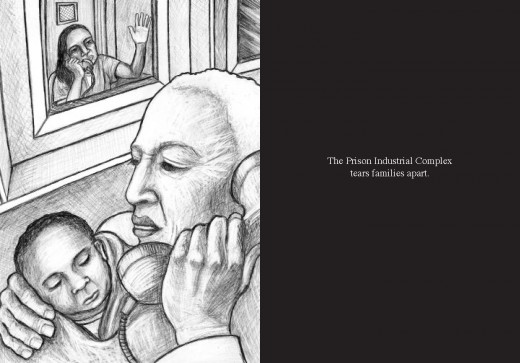Families in Touch: Reconnecting Families of the Incarcerated By Providing Rides to Prison…
I received a letter from a grandmother on the west side of Chicago last April. I will call her, Mrs. G since she asked for confidentiality. I spoke with her over the phone and she gave me permission to share her story though she asked that I not identify her family’s name for reasons that may become clearer later.
Anyway Mrs. G had heard about my organization’s work from a neighbor of hers in Austin, a community on the West side of Chicago. I don’t know about how the neighbor heard about us. Mrs. G was writing to ask for our help. Her grandson, who was 15, had committed a violent crime at 13 and he is currently locked up in one of the juvenile prisons in the state. Mrs. G is raising five of her grand kids ranging in age from 4 to 16. She informed me that she is a diabetic and is insulin dependant. Again the relevance of this will soon be clear.
Mrs. G has little social support, particularly since her grandson’s crime. His crime has alienated her even more from her neighbors. She is living on disability and has only a little financial support in the form of food stamps and medical insurance for her grand kids.
She had heard that her grandson was not doing well in prison. Mrs. G has no phone service and cannot easily make any calls to her grandson. He also cannot easily reach out to her. Over the previous 19 months, she had not talked to him at all. She did receive some letters from him but she struggles with literacy and has to dictate her response to one of her grand kids. She really wanted to visit her grandson however she did not have the funds or means of transportation to do so. She was reaching out to me to ask if my organization could either provide her with transportation to the prison or if we could provide any funds so that she could visit her grandson.
Once I received the letter, I got right back to her through her friend and told her that while this is not our regular practice, I would be happy to provide her with the $100 that it would take for her to cover her expenses to go to the prison to visit her grandson.
She got back to me in early June to say that had visited her grandson. She was grateful for our help and said that her grandson was relieved to know that he had not been forsaken or forgotten by his family. For the moment, this was a happy ending but it got me thinking about the hundreds of Mrs. G’s that have to exist just in the Chicagoland area.
What could be done to more systemically address this issue of family visits to youth prisons in Illinois? I know that my tiny, resource-strapped organization certainly can’t afford to provide $100 to each family who might be in a similar situation as Mrs. G was. And yet $100 seems to be such a small sum for the temporary peace of mind that Mrs. G and her grandson now had. I have to admit that I had not really given this issue much thought before my interaction with Mrs. G. But since her letter, I have not been able to stop thinking of the many families who want to maintain contact with prisoners but who are faced with many barriers and obstacles. This has policy consequences especially for issues of successful prisoner “re-entry”. It also has profound moral and social consequences.
Before jumping into a full fledged advocacy campaign on this matter though, I would like to know more about the process of family visits in Illinois youth prisons. I spent a little time last May doing some very preliminary investigation about prisoner family visits in the research literature. Data suggests that more than half of all prisoners do not receive in-person visits from family members (Mumola, 2000). There are a variety of explanations for why families may not visit, including distance of the prison, financial burdens, problems with the prison bureaucracy, and strained or severed relationships with the prisoner (Hairston, 2003). I wrote about some of what I found on this blog back in July of last year.
One of the interns who is working with me this year has taken on the difficult task of creating a volunteer-led and volunteer-run effort to provide free transportation to family members who have youth in Illinois prisons. We are launching this initiative this week with an orientation meeting for interested volunteers who would like to use their own cars to provide rides for our pilot program. My intern, Tobin, has spent several months working with IYC-Warrenville (our youth prison that houses young women in IL) to establish this new initiative. We will start small and will build from there depending on the response that we get from volunteers and from the families who take advantage of the free rides.
I am often asked by people how they can help to address the issues facing youth in conflict with the law. Well, the Families in Touch initiative is an easy and non-time intensive way for Chicagoans to support incarcerated youth and their families.
For information about the upcoming new volunteer orientation meeting taking place this Saturday April 16th, click here. Even if you cannot make this meeting on Saturday, you can still volunteer. Contact Tobin at [email protected].

